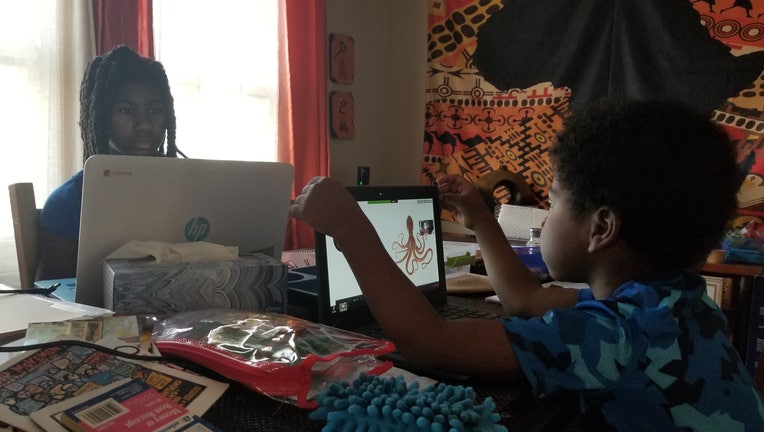'It's a challenge to maintain our empathy:' Parents struggle with online learning at home

The Manigo-Tanksley children learn at their Oakland home during coronavirus.
OAKLAND, Calif. - Gina and Ron Muriera, whose two children are in a private Catholic school in San Jose, are finding themselves being co-teachers in addition to their full-time jobs.
"A lot of times we are the support, helping kids with work," Ron Muriera said. "Very little is getting done online and it’s left up to us."
Added his wife: "It's a challenge to maintain our empathy."
They are just one of many California parents whose support for distance learning has plummeted since March, according to a statewide poll from The Education Trust - West.
In March 2020, when COVID-19 began closing schools, 57 percent of state parents supported the idea of distance learning, according to a similar poll. That number has dropped 22 points, with only 35 percent of parents rating their child's experience with distance learning as "successful."
"Despite the fact that everyone was forced to quickly adapt from in-person to distance learning in March, parents - particularly parents of color - are increasingly losing faith in the education that their children are receiving," Dr. Christopher Nellum, the deputy director of research and policy at The Education Trust - West, said in a statement. "While parents initially were optimistic about schools' approach to distance learning, parents want to see a renewed urgency from schools, districts and policymakers."
Most Bay Area counties ordered residents to shelter in place on March 15. Four days later, California Gov. Gavin Newsom's statewide shelter-in-place order closed state schools. Most remained closed the rest of the term. A majority of California's schools re-opened for fall via distance learning, with some allowing various levels of physical access.
As of Oct. 13, 10 of California's 58 counties still fell in the most restricted level of the state's COVID-19 tracking system, according to the nonprofit education news website EdSource. Half the parents surveyed said their child's school hasn't provided information about the upcoming spring semester.
Fifty-five percent said they want more real-time instruction for their children.
The online poll of 800 parents of children in California schools was conducted by Global Strategy Group, from Oct. 1 to Oct. 7.
Some Bay Area parents say the results of distance learning are mixed.
Renee Strom, whose 16-year-old son, Tyler, goes to College Park High School in Pleasant Hill, says having Tyler home has improved their relationship. She calls their time together the pandemic's "silver lining."
His academic experience has been a different story.
"Online learning is taking its toll on my kid," Strom said. "Too much time online for classes and online homework. He has screen fatigue and literally crashes the second it's over. My 16-year old has naptime now. Plus, he games with his friends for a while at night; the only way he can be social now. He says he feels like he's not learning and worried that when they go back to school, he will feel dumb. He's keeping his grades up but he hates this."
Joanna Rosales has three daughters in San Francisco public schools. The experience differs, depending on the child. Two of her daughters have adapted well, she said.
Her middle-schooler, however, is at a new school, which contributes to her struggle.
"She doesn't know anyone at her new school, and it's impossible to make friends via Zoom when you're 11," Rosales said. "The switching of classes, multiple Zoom links per day, is a s--- show. We're still dealing with broken links."
Rosales is a senior program officer for San Francisco's Department of Children, Youth and Their Families and sees how adjustments to online schooling aren't being made. "Kids are plummeting through the cracks," she said. "If you are lucky enough to have a parent supervise at home during the day, your kid will be fine. If you have to go to work, it's a hot mess. I see kids taking Zoom (classes) in a closet, from bed, etcetera. Kids are completely unsupervised and lost. Schools should not be daycare centers."
Ninety-four percent of parents surveyed said regular access to their child's teacher would be the most helpful thing schools could provide. Lack of reliable internet is a big concern for 44 percent of parents overall, and especially for parents with lower incomes (58 percent) and Latinx parents (52 percent).
Only 35 percent of parents reported their child's school has made free internet access available, and 59 percent said their schools provided access to technology like laptops or iPads. Parents of color overwhelmingly (88 percent) said free internet would be helpful. Ninety percent of parents (93 percent of Black parents) said access to additional academic resources and tutors would be helpful.
Only 48 percent of parents surveyed said they had regular contact with school personnel to ensure connectedness.
Pecolia Manigo, a parent of three children in Oakland public schools, acknowledged that with five people at home, the "Internet is the biggest headache for us, even when we pay for it, monitoring how many devices are on at one time."
Then, there's her youngest; a kindergartner at Manzanita Elementary School.
"He gets frustrated and has mood swings," Manigo said. "It's hard to work with him and I don't have a degree in child development."
But despite the challenges, her family is not so anxious to return to in-person classes. Her oldest, Niani Manigo-Tanksley, a senior at Skyline High School, has congenital heart disease and they fear for her health and safety.
For now, Niani said that her classes haven't been that hard and she's seeing that many of her peers are trying to get by doing the least amount of work possible.
"School could be more interesting," she said. "A lot of teachers are just lecturing. Students are bored. It’s really draining. And I know our parents are stressed because our education is on the line."
KTVU's Lisa Fernandez contributed to this report.

